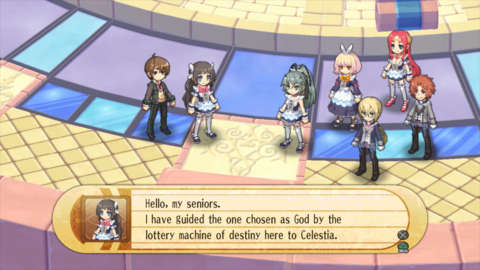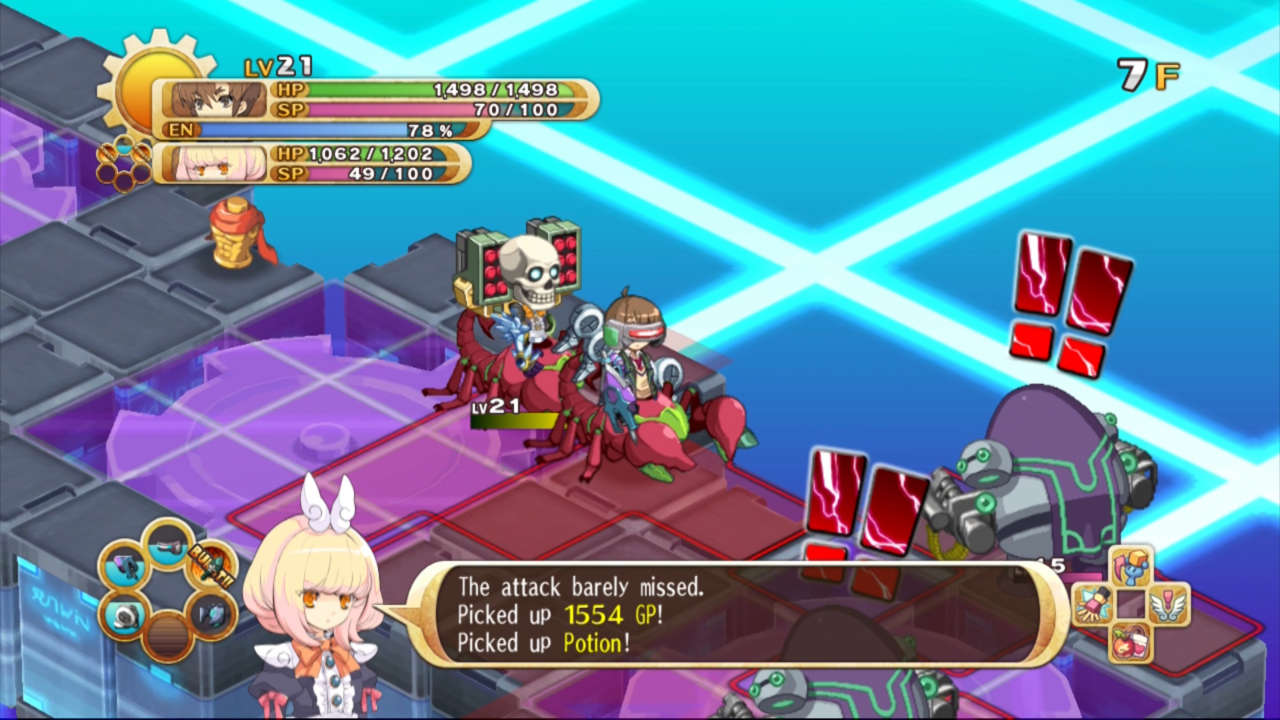Congratulations! You have been randomly chosen to become God. As the newly appointed ruler over all creation, you shall be whisked away to the heavens above to fulfill your holy duties--which may include battling mermaids and flirting with angels.
Such is the fate of Renya Kagurazaka, an everyday, mild-mannered, dime-a-dozen, completely generic high school student. That's right: The Guided Fate Paradox presents a truly nightmarish scenario where God is, in fact, one of us. It's a goofy premise, since a lot of this fate guiding involves helping a weak-willed zombie find his courage or a knightly couple fall in love.
Sadly, the game chooses not to embrace this silliness, and instead gets bogged down in a workaday, good-versus-evil plot culminating in a workaday, good-versus-evil showdown. The fact that you're playing as God is of no real consequence; it's just a flimsy rationale supporting the game's singular purpose: level grinding.
The Guided Fate Paradox is a turn-based role-playing game played on a grid. Combat and exploration are not separate modes, so every step your take, or attack you make, counts as a turn. After you act, your partner acts, and then all the enemies act in unison. As you fight, you collect equipment for Renya--aka God--and friends to use, which confers new attacks, spells, or other special abilities. It's a play style reminiscent of the roguelike genre, but with a Japanese RPG twist in character advancement and death.
Paradox's woes start with leveling up, which is divided across many systems. By juggling these different systems, Paradox makes you feel as if you're getting stronger, but the complexity of this system also makes it difficult to understand exactly how strong you've become.

This is especially vexing when Renya is humming through a dungeon, dropping all challengers with a single blow, and a few floors later wanders into a foe that can do the same thing to him. Finding a happy medium where your abilities are comparable to your foe's is a rarity, which is disappointing since those moments are when Paradox is at its best. They force you to stop and think about the battlefield, and carefully calculate every action.
Surmounting one of these encounters is a triumph, but it's short-lived. Renya inevitably outpaces his foes, and then it's back to the mindless slaughter. Some different enemy types would help break up the monotony, but Paradox has only a handful of different foes and none of them are especially interesting to fight. Many simply behave like zombies, wandering aimlessly until they spot you and then relentlessly attacking you until defeated. A handful of boss encounters offer complex challenges, but aside from those endeavors, enemy encounters are simple affairs. One of the most complicated enemies you encounter is a snail with a shield covering its face. The shield blocks all attacks from the front, and the snail follows you around. Besting this devious adversary requires all the trickery and guile of maneuvering someone behind the snail for a flanking attack.
A variety of stage gimmicks, including explosive traps and moving platforms, attempt to put a spin on these encounters. However, the enemies and stage gimmicks don't play off each other in interesting ways, unless by total accident. The only constant in Paradox is the grinding: a circular system that rewards grinding with the ability to do more grinding.
Not even death can stop the grind. One of the cheapest items in the game lets you escape from any dungeon with all equipment in tow, so there's really no excuse for dying. You can also safeguard your best equipment in a special vault that lets you continue to use it without the fear of losing it upon death. And if the worst should come to pass, you don't have too much to worry about so long as you remember to save your game before entering the dungeon.

After you finish the game--a feat that could easily set you back more than 40 hours--something interesting happens. A survival dungeon is unlocked. This dungeon negates all of your base stat advancement, and lets you use only the items recovered in that dungeon. You can improve your characters and their items, just as you would in the rest of the game, but that progression is lost once you leave the dungeon. This goes a long way toward providing a consistent, satisfying challenge. Both Renya and his enemies start at the same level and advance along a similar curve. Play smart, and you can make life easier for yourself by getting ahead of that curve. Alternatively, if you rush through the dungeon the enemies will quickly outpace you.
With its intricate leveling system and randomized dungeons, The Guided Fate Paradox succeeds in creating a game that can easily gobble up biblical amounts of time. It's simply too bad all that time spent ends up feeling like a waste when there's no great payoff for all that hard work.